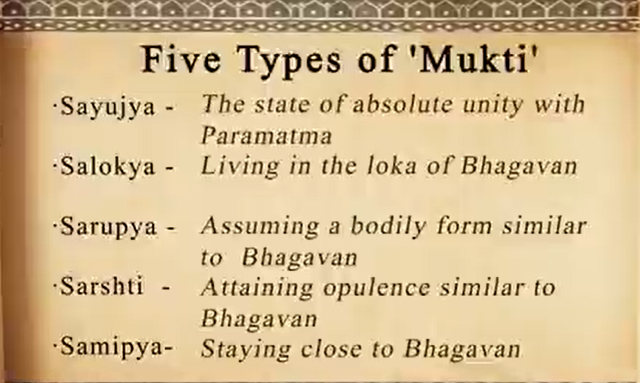What is Mukti and Types of Mukti

Meaning Of Mukti
It is said that one who is knowledgeable knows that after wandering in 8400000 species, this human body is obtained. It should not be wasted at all. The only purpose of this human body is to return to the supreme abode with the help of devotion to God, which is called liberation.

Types Of Mukti
We all want to get liberation after death, but what kind of salvation do we really know the meaning and type of liberation? Liberation begins at zero, but it continues to exist positively till the end. We can classify its entire form into five categories. Which are as follows…

1- Sayujya Mukti
In this type of liberation, we merge into the nature and existence of God. That is, in the Supreme Brahman light emanating from the body of the Lord, the soul is completely absorbed and merged.
2- Salokya Mukti
Salokya Mukti means to attain the world after death where Lord Shri Bhagavan resides. After such devotion, the soul resides in his own world with Shri Bhagwan. She/He does not return to earth again.
3- Sarupya Mukti
In this liberation, the soul attains the same form as Sri Bhagavan after death. Due to this, the soul acquires a four-armed form similar to that of Lord Vishnu sitting in Vaikuntha, who is called a councilor. However, there are two main differences between councilors and God. Lord Vishnu wears a Vaijayanti garland around his neck and Shrivatsa symbol on the chest, which is not included in the whole body of the councilors.
4- Samipya Mukti
The basic meaning of samipya is to be near. In this type of liberation, the soul remains in the company of Shri Bhagwan i.e. close to Him. In this way the soul who attains sampiya liberation after death is never far from God. is always with them.
5-SARSHTI MUKTI
This Mukti is quite different from other Mukti and their types in which the soul is given all Aishwarya and happiness like God. He is bestowed with all the opulence and happiness equal to that of Shri Bhagwan.
Conclusion
In fact, it is necessary for us to know the types of liberation only for the sake of knowledge, but in reality, a true devotee of God is the one whose basic goal is to attain the company of Shri Bhagavan and who seeks any of these five types of liberation, in particular, does not wish.